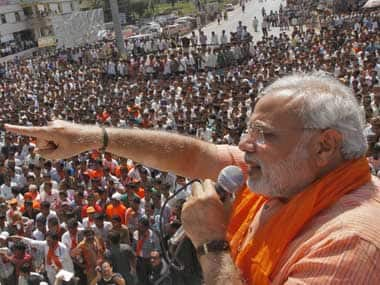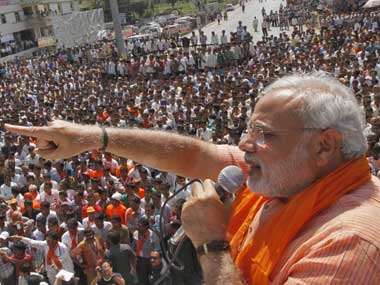As Chief Minister of Gujarat, Narendra Modi has had little use for economists and intellectuals. His political economy ideas were rooted in a simple belief in Gujarati entrepreneurship and providing firm, effective governance that was personally supervised by him. He relied on technocrats and technocratic solutions to enable agriculture and industry to flourish in his state.
Will it be any different as he moves to the national scene as the BJP’s prime ministerial candidate? Will his India vision be any different from the Gujarat model?
As Firstbiz noted earlier, the answer is yes. The economic education of Modi has begun in right earnest, and, from all accounts, Modi is a sharp and keen learner. Untutored on economics - P Chidambaram unkindly alleged last month that Modi’s knowledge of economics could be put on the back of a postage stamp - Modi is trying to distil economic wisdom from experts and marry it to political logic. He is trying to understand economics for the simple reason that it also has to make for good politics and sold to the people.
[caption id=“attachment_75918” align=“alignleft” width=“380”]
 Will it be any different as he moves to the national scene as the BJP’s prime ministerial candidate? Will his India vision be any different from the Gujarat model? Reuters[/caption]
Will it be any different as he moves to the national scene as the BJP’s prime ministerial candidate? Will his India vision be any different from the Gujarat model? Reuters[/caption]
If all goes well, the education of Modi will result in a big speech outlining his political economic vision around end-February or early March, around the time elections are announced. His 19 January speech at the BJP national executive meet, where he talked about 100 new smart cities, among other things, was apparently only a trailer. His full economic vision will be coming over the next two weeks.
In doing so, Modi has quietly acknowledged that India cannot be ruled like Gujarat and is widening his circle of advisors on the economy. As already noted by Firstbiz, Arvind Panagariya, Bibek Debroy and Rajiv Kumar are some of the economists Modi and the BJP are consulting to build a big picture economic gameplan for a Modi-led government if he wins the next election.
Today’s Economic Times adds two more names to the list of Modi advisors - Ravi Mantha (an ex-Fidelity investment expert), and Manish Sabharwal, chief of TeamLease - and offers new insights on how Modi is adapting to the idea of a listening to a wider circle of advisors and intellectuals.
The story makes it clear that Modi sees fixing the economy and painting an easily understood economic vision for the future as vital to his image. As a great communicator, Modi’s speeches so far have only had political rhetoric against the Congress and the dynasty; now they could have economic punch as well.
One key idea seems to be the vision of 24 x 7 electricity for all - which is said to be the equivalent of Vajpayee’s Golden Quadrilateral project that drove growth in infrastructure.
The ET story talks about how Modi is adapting to the idea of listening to experts even while identifying elements that can be messaged politically. Apparently, Modi is a keen listener and learner, and if he doesn’t understand anything, he will admit it and say “I don’t understand.”
Modi, says the newspaper quoting sources, listens not just to one or two advisors, but many others before making up his mind. In fact, one element of Modi’s interactions with experts confirms his basic secretive nature - and an expert in one area may not know an expert in another. Says ET: “Not everyone of his advisors knows when he’s meeting whom (and) for what. It’s (on a) need-to-know basis. Sometimes, he takes different inputs from different people on the same subject.”
By end-February or early March, we will know the end-result of the education of Modi - and how that translates into a vision that ordinary Indians can understand.
(Read the full Economic Times story here )
)